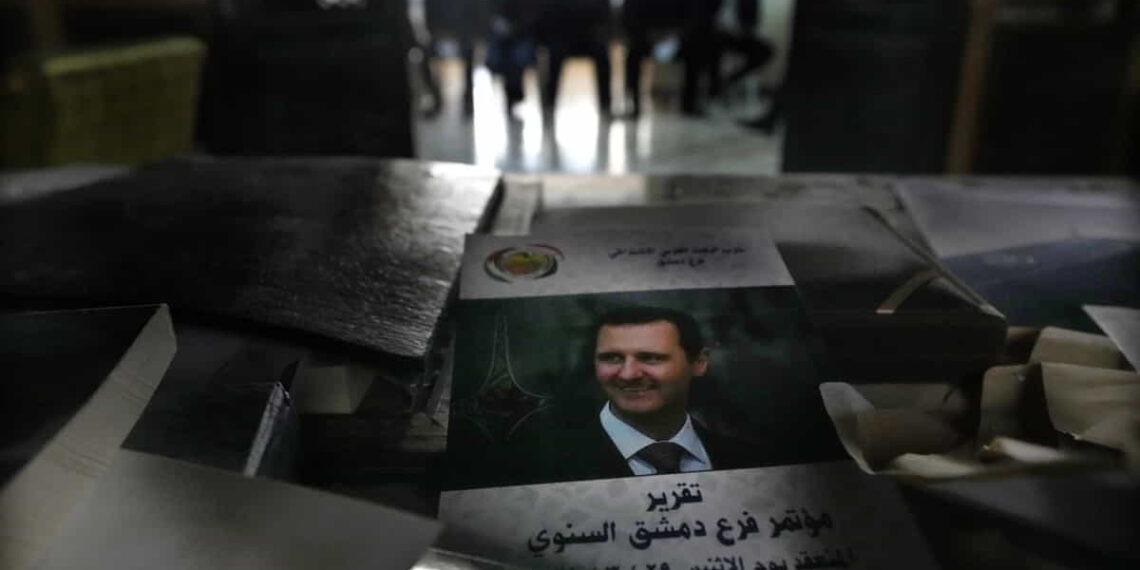Syria’s Long-Ruling Baath Party Faces Collapse After Assad’s Overthrow
In a historic turn of events, Syria’s ruling Baath party, which had governed the country for over six decades, is now unraveling. Following the fall of President Bashar Assad, insurgents have forced the party into disarray. The Baath party, a pillar of the Assad regime, announced it was freezing its activities, signaling the dramatic end of an era.
The fall of the Baath party has led to a shift in power in Syria. Many high-ranking members of the party have gone into hiding, and some have fled the country entirely. In a symbolic move, the new ruling authorities have repurposed the former party headquarters in Damascus into a registration center for ex-members of the army and security forces, where they must turn in their weapons.
Calls for the formal dissolution of the Arab Socialist Baath Party, which had ruled Syria since 1963, have intensified. Many former party members and ordinary Syrians alike are vocal about the party’s role in the country’s corruption and its damaging impact on relations with other Arab states.
A Longtime Party Member Speaks Out
Mohammed Hussein Ali, 64, a former state oil company worker who was a Baath member for decades, reflected on the regime’s collapse. “The party should not only be dissolved, it should go to hell,” he said, expressing satisfaction over the end of Baath rule. Ali had quit the party in 2011 at the start of Syria’s anti-government uprising, which eventually led to the civil war.
The Future of the Baath Party
A representative from Hayat Tahrir al-Sham (HTS), the group that led the offensive against Assad’s regime, has hinted at a possible reckoning for Baath party officials. The HTS leader, Ahmad al-Sharaa, stated that those who committed crimes against the Syrian people would be brought to justice, which could include former Baath members.
Founded in 1947 by Syrian Arab nationalists Michel Aflaq and Salaheddine Bitar, the Baath party once aimed to unite Arab countries under one banner. It had a significant presence in Iraq, where Saddam Hussein ruled before being ousted in 2003. In Syria, the party became synonymous with the Assad family, which has used its control over the Baath to maintain power since 1970. Over the years, Assad’s regime bolstered the party’s influence, appointing members of the Alawite sect, the family’s minority group, to key military positions and blending nationalist rhetoric with sectarian rule.
Former Baathists Reflect on Their Role
Abdul-Rahman Ali, a former soldier and Baath party member, recounted his experience of living under the regime’s control. Ali, now 43, had no idea that the Baath party was founded by Aflaq and Bitar, as he had always assumed Hafez Assad, Bashar’s late father, was the founder. “I am happy. We have been liberated from fear,” Ali said, describing how Syrians were too afraid to speak freely due to the pervasive surveillance of the security agencies. These agencies, notorious for their brutality, would detain and torture anyone suspected of opposing the regime.
Many Syrians were required to join the Baath Vanguards, the party’s youth branch, as early as elementary school, where they were indoctrinated with Arab nationalist and socialist ideology. The party’s grip on the country meant that non-members found it nearly impossible to secure government jobs, military positions, or roles in the intelligence services.
A New Era or Sectarian Reprisals?
As the Baath party crumbles, some Syrians fear that the Sunni majority now in control of the country could engage in a “de-Baathification” process similar to what occurred in post-Saddam Iraq. In Iraq, the de-Baathification campaign, which aimed to purge Saddam loyalists from government institutions, resulted in sectarian tensions and contributed to the rise of extremist groups such as al-Qaida and ISIS.
While few mourn the Baath party’s collapse, there are concerns that targeting former party members could further fuel sectarian divides in Syria, particularly given the Sunni-majority control now in place.
A Party Member’s Last Stand
Despite the growing calls for dissolution, some Baath party members still hope for its revival under a reformed, multiparty democracy. Mohammed Merhi, a former army colonel and Baath party member, was among those who lined up to surrender his weapons at the former party headquarters. Merhi acknowledged the flaws within the party, but he believes its core principles, which aim for Arab unity, are worth preserving.
“I want to become again a normal Syrian citizen and work to build a new Syria,” Merhi said after handing over his Soviet Makarov pistol and receiving a document that allowed him to move freely within the country. His hope is that Syria can move beyond the corruption and authoritarianism that defined the Baath era and build a new future based on democratic principles.
Conclusion
As Syria grapples with the collapse of the Baath party, the country stands at a crossroads. While many welcome the end of a regime that has long been associated with repression, corruption, and sectarian division, the future remains uncertain. The challenge now is to rebuild a Syria that can heal from decades of conflict, ensuring that the lessons of the past are not repeated in the pursuit of a more just and inclusive society.
This article was rewritten by JournosNews.com based on verified reporting from trusted sources. The content has been independently reviewed, fact-checked, and edited for accuracy, neutrality, tone, and global readability in accordance with Google News and AdSense standards.
All opinions, quotes, or statements from contributors, experts, or sourced organizations do not necessarily reflect the views of JournosNews.com. JournosNews.com maintains full editorial independence from any external funders, sponsors, or organizations.
Stay informed with JournosNews.com — your trusted source for verified global reporting and in-depth analysis. Follow us on Google News, BlueSky, and X for real-time updates.














